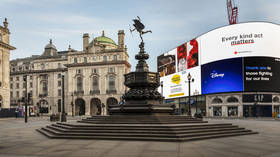High Street is dead: Covid-19 and lockdowns leave once-bustling cities like empty husks, as jobs, housing and opportunity vanish

Not needing to live close to the office, young city dwellers reassess their priorities as the benefits of living in a town dwindle, with theatres, galleries, pubs and restaurants closing, perhaps forever.
Take a trip to your town centre some time this week, before the schools return, and you’ll notice a strange school holiday occurrence. No kids.
The local shopping precinct has long been the place to hang out for bored teens during the school break, shouting and laughing, clattering around on skateboards, eating junk food and making a general nuisance of themselves.
Annoying at the time, but now something we miss, thanks to the coronavirus pandemic.
The shops and malls of the UK are pretty much a no-go zone, not that there’s much left of them anyway.
And the only shoppers you will notice are older adults, grimly wearing masks and striding purposefully as they hurry to complete their chores.
It is no fun to be out at the shops. It’s all ‘Exit this way’, ‘Face coverings must be worn’ and hand sanitiser stations suddenly appearing on the pavement. Where did they come from?
You don’t see harried mums with pushchairs, arms full of carrier bags and bawling children rifling through clothes racks because taking the kids shopping would require the logistic strength of the military and the observational powers of GCHQ.
It’s far easier to simply stay at home and order everything online.
Restaurants, cafes, sandwich shops and bars have been the obvious victims of the economic meltdown but huge retailers like John Lewis, Boots, WH Smith and Marks & Spencer have also been hit. Hard.
No longer able to make all their town centre stores profitable, thanks to high rents and sluggish footfall, they are shutting up shop across the country and moving to soulless retail parks located on the outskirts of town and simultaneously rethinking their online strategies.
And cutting jobs in the process. Thousands of jobs. As Archie Norman, the chairman of M&S put it in the company’s annual report before announcing the loss of 7,000 jobs this week, never waste a good crisis, and while he was invoking the spirit of Winston Churchill with that sentiment, he’s not alone in using the economic downturn as an excuse to do some badly needed housekeeping at the retail giant. The M&S board is using the pandemic to implement some brutal changes.
Norman told The Times, “It provides a mandate to make decisions that we have hovered over. It is why we said ‘never the same again’ because we can never go back.”
But it’s not just schoolkids you’ll miss in town, it’s the Millennials buying trainers and clogging up coffee shops sipping flat whites and texting constantly on their smartphones as they break their trip to the next meeting.
The young people you will see in town are those either heading to or coming from work but in this new world you won’t be seeing them around for much longer. They’d be mad to stick around just to see the chances of employment, housing and economic opportunity dwindle before their eyes. It makes no sense to insist on living in a town centre, spending a huge proportion of your salary on renting a shoebox-sized flat.
Not that long ago, working from home was viewed by many bosses as a no-no.
Staff were thought to be unproductive skivers but that’s no longer the case as many businesses realise they can save the office rent and business rates they pay in town, have the staff working remotely and still turn a profit.
For those looking to buy a home, having to live close to public transport or within an easy commute of the office is no longer a big concern and houses are a lot cheaper out of town.
And it hasn’t taken long for the penny to drop with the UK house market surging thanks to the pandemic. July was the busiest month for house sales in 10 years and the run is expected to continue moving forward.
The freeze on stamp duty, negligible interest rates, competitive mortgage products and the acceptance of remote working have created ideal conditions for the big jump from costly town centre rental to a home of their own somewhere nice with a garden, where crime is something that happens in other places.
Also on rt.com UK’s plan to pump billions into broken housing system won’t help those weeks away from post-Covid homelessnessLondon’s famed nightlife, a huge attraction for millions of young people, has been decimated.
The theatres have been shut for months, music gigs scrapped and galleries and museums operating on a ticket-only basis and greatly reduced capacity. Frankly, what’s the point of living in the capital if you can’t take advantage of any of its supposed benefits?
So the Millenials are on the move, taking their coffee culture and laptops with them. They’ll drop by occasionally, maybe for the next Black Lives Matter or Extinction Rebellion protest.
London and other large, formerly bustling towns and cities not just in the UK, but all around the world, will be poorer for it, as the life and energy drain away in this massive social exodus, leaving behind the older generations and their empty streets..
The worry is that they will never return.
Think your friends would be interested? Share this story!
The statements, views and opinions expressed in this column are solely those of the author and do not necessarily represent those of RT.















